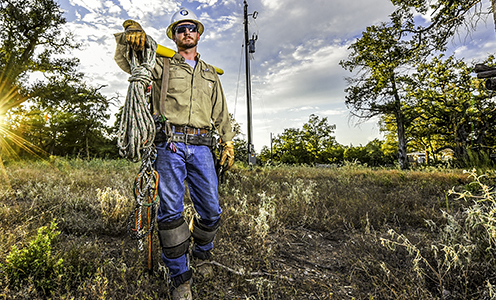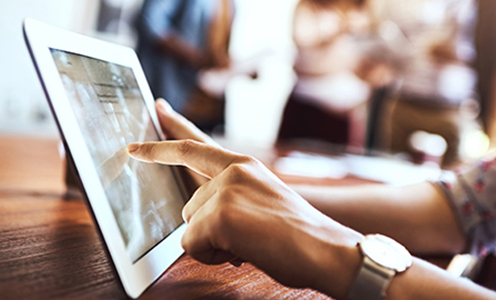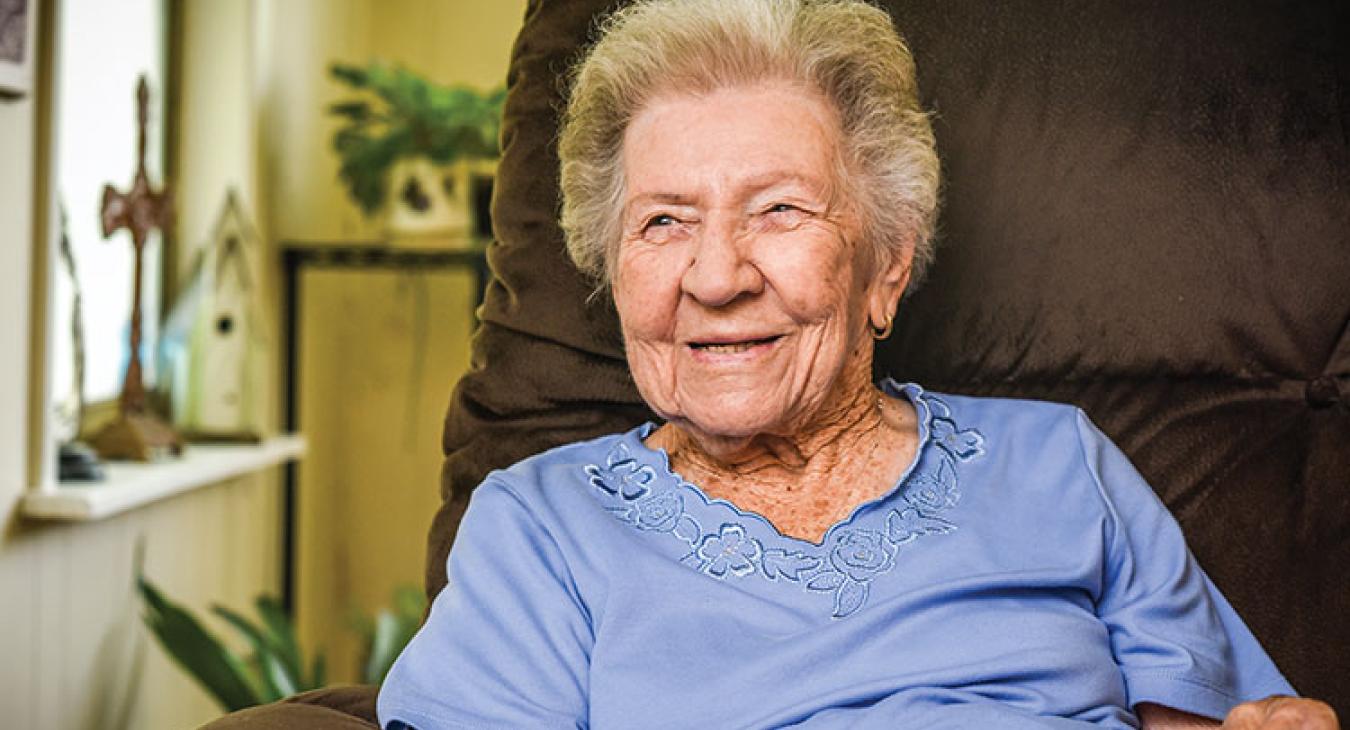At 98, Mildred Richter still has vivid memories of the days electricity arrived at her family's farm. (Sarah Beal Photo)
At First Light: Remembering the Dawn of Electricity
This is one in a series of stories about some of Bluebonnet Electric Cooperative’s earliest residential members
By Clayton Stromberger
One-two-three, one-two-three...
Like a graceful waltz, Mildred Richter’s life has moved gently and joyfully through almost a century of time and space in Washington County — through rows of cotton and corn on the family farm in Prairie Hill and through sing-alongs, church socials and volleyball games in her youth, like the one where her husband-to-be Wilbert flirted by wrapping the net around her.
She went to countless community barn dances on weekend nights, the music often supplied by brothers and cousins who sometimes played till dawn.
She had a happy marriage and raised three sons. Her dance through life included years of taking care of parents and parents-in-law, and being a grandmother and great-grandmother.
And she can still remember when electricity first arrived to guide her way.
Through it all, Richter, 98, still moves forward, just a bit more slowly. She laughs often, makes her famous hot rolls for family gatherings and shows her grandchildren how to quilt. She probably still would be trying to use the riding mower at her home north of Brenham, but her son James cut in on that dance about five years back.
“I took the lawnmower away from her,” he says in a firm admission of guilt.
“He was going to put new belts in it, and it never came back,” Mildred says.
Richter was born in 1921 in Prairie Hill, one of 10 children of Fritz and Lena Kramer, whose families emigrated from northern Germany in the late 1800s. Land was 50 cents an acre, and her parents farmed 114 acres. Her family lived the way all farm families lived before electricity — doing everything by hand, attuned to the rhythms of nature.
“When I was 6 years old, we’d all be out in the cotton patch, picking cotton, and if it was too hot, we could sit under the tree for a little bit,” Richter remembers. “We always had to be working. We were 10 children. When the older ones went away, I had to take over, and the younger ones took over after me.
“Cotton, corn, sorghum — we had big barns, and we canned two or three hundred bottles of food for the winter. We had everything — peas and beans and cabbage and lettuce, onions. We never did buy any food, except flour and sugar, at the grocery store up the hill. We raised everything we ever ate, we made all our own clothes, made them out of feed sacks.”
Richter rode a donkey with a neighbor the first day she went to school, 4 miles away. The children went barefoot until their father could buy some leather and fashion a set of family shoes.
For a time, Richter’s whole family lived in one house, including her father’s parents. One kerosene lamp lit the living room. “We all went to bed before dark,” Richter says. “But sometimes we’d sit out on the woodpile, and we’d sing at night.” The neighbors down the road would hear the sound and stroll over and join in. “When the moon was out, it was so pretty,” she remembers. Hymns were a favorite, especially “Amazing Grace.”
The farm, which Richter’s father sold in the early 1960s, is still visible from the road in Prairie Hill. The old family house was torn down earlier this year.
Richter vividly remembers the day electricity came to the area.
“Here we saw these people come into our land,” she says, “and we thought, ‘What in the world are they doing?’ And all at once we saw them put poles up, and they were walking on the poles with cleats, and they had these little green cups made out of glass that they connected way up on top.” Eventually a power line from Bluebonnet Electric Cooperative (at that time named the Lower Colorado River Electric Cooperative) led from a pole to the farmhouse.
“We just had one light,” she recalls. “We'd pull the string, and we thought we were in heaven.” Richter laughs at the memory. “My brother-in-law wired the light, without knowing how to do it. We could read and everything, and we didn’t have to use candles or kerosene.”
Richter’s parents embraced the electrical age. “My dad was this way: If he could find anything that worked with electricity, he would buy it,” she says. “A washing machine and a stove and a refrigerator.” Her father drove to Sears, Roebuck & Co. in Brenham or Montgomery Ward and brought home each new appliance.
Richter grew up using a traditional treadle sewing machine until the electric models arrived. “The electric one worked a lot better,” she says. “But my mother-in-law wouldn’t touch that machine for nothing in the world. She never did — she was scared of it.”
Mildred and Wilbert, a native of neighboring Gay Hill, married in 1943.
Wilbert was trained to be a tail gunner during World War II. But before the war was over, his parents’ health began to fail and he had to leave the service to return home. He and Mildred lived on his parents’ farm until 1962, when Wilbert’s mother died. Wilbert took a job on a nearby ranch, and the family moved there — with Wilbert’s father — until they built the home in the late 1970s where Richter lives today.
At some point, a television took its place in the family home. James Richter recalls the Saturday
night ritual: “We had to watch Lawrence Welk, and Joe Feeney would be singing.”
Mildred and Wilbert danced whenever they could. “He loved to waltz,” she remembers. “We had a lot of fun.”
Wilbert died in 1996. “I still miss him,” she says simply.
Richter uses a walker a lot these days, but she can still cut a rug, softly, when music plays. “My last dance was a few years ago at my nephew’s wedding at Round Top,” she says. “My granddaughter and I both went, and we danced like everything that night. It was good!”
She’s the last surviving member of that big family in the farmhouse illuminated when electricity arrived. “Everybody is gone but me,” she says. “We girls, my sisters, they were always there; we were always together. We quilted together, danced together, taught each other how to cook.”
Her advice to her grandchildren and great-grandchildren?
“Always be happy,” she says. “If they can just keep going, that would be my prayer. You don’t ever stop. You don’t stop living.” Richter works out daily on a gently sloping exercise ramp with rails that James built for her in the garage.
A visitor asks: Would she be willing to waltz a bit? “Sure!” She maneuvers the walker to her little kitchen, a waltz is found on a laptop computer, and Mildred dances again by the small table, beaming, perhaps seeing Wilbert there, smiling back at her: One-two-three, one-two-three, one-two three...
Download this story as it appeared in the Texas Co-op Power magazine »





